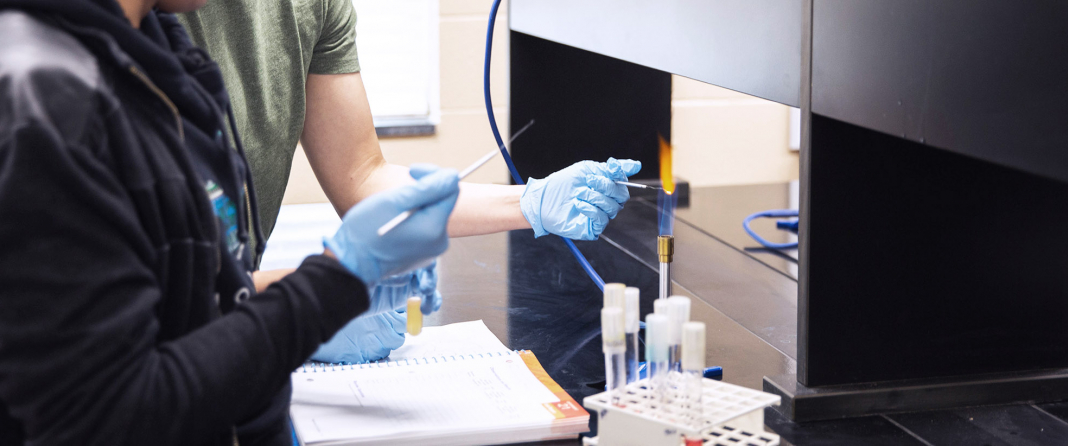Overview
Teachers in the STEM fields are in high demand. If you are looking for a way to intersect your love of biology and your desire to inspire and prepare today's youth for the future, Trevecca's bachelor's degree in Biology Education may be right for you!
At Trevecca, we aim to provide our biology students with a broad understanding of the discipline, from the molecular basis of life to the integration of life processes regulating the function of whole organisms. By emphasizing critical thinking, scientific communication and laboratory skills, we seek to prepare students to succeed in within any school system. This program was built by collaboration between the biology department and Trevecca’s School of Education, to provide students with a well-balanced education of teaching and biology. Students' education experience will culminate in student teaching.
Earning your degree in an atmosphere where academic rigor meets strong Christian community, means you’ll be able to take full advantage of our newly renovated facilities and state-of-the-art equipment without sacrificing your values or beliefs.
Our professors all hold the most advanced degrees in their fields and come from a wide range backgrounds from diverse culture, academic and professional. This diversity allows students to learn, grow and challenge their perspectives.
Studying biology at Trevecca means getting hands-on in your major, from undergraduate research, summer internships, medical missions trips, community education and outreach events, Trevecca’s biology faculty are always looking for new ways to enhance each student’s experience.
Earning your biology education degree at Trevecca means fully immersing yourself in both biology and teaching, ensuring that you are fully prepared for the future ahead.

Faculty
News
Core Classes
Science Philosophy and Practice
SCI 1050
An introduction to the methods used in the practice of science and the philosophies and standards that guide the scientific community as it seeks to advance the understanding of the natural world. Topics will include the process of science, scientific ethics, analysis and presentation of the results of scientific studies, reading and writing peer-reviewed scientific papers, and careers in science. Lecture.
Course Hours: 1
General Biology I
BIO 1510
An introduction to fundamental concepts in the biological sciences including the organization of living matter, cellular structure and function, food production by photosynthesis, energy harvest, mechanisms of cellular reproduction, genetics, and evolution. Discussions of current scientific issues will also be included. Lecture and lab. Fee charged.
Course Hours: 4
General Biology II
BIO 1520
A study of diverse structures and functions observed in a variety of prokaryotic and eukaryotic organisms, with emphasis placed on plants and vertebrates. The study of the Kingdom Plantae will include investigation of plant life cycles and reproductive strategies. Topics including respiration, digestion, and reproduction will be introduced in the study of vertebrate animals. An introduction to ecology and the impact of humans on a variety of organisms will also be included. Lecture and lab. Fee charged.
Course Hours: 4
Microbiology
BIO 2820
A survey of microscopic organisms with emphasis on bacteria and fungi. Classification, morphology, cultivation, and identification will be studied in both lecture and lab. The role of these organisms in the ecosystem, industry, and disease will also be discussed. Lecture and lab. Fee charged.
Course Hours: 4
Ecology
BIO 3040
A course that promotes the understanding of ecosystems as a whole and the influence of humans as top predator to either balance and preserve or disrupt and destroy these systems. The study will include interactions of ecosystem constituents, both community and population, and their contribution or detriment to the system. Emphasis will be placed on the use of biodegradable materials in all aspects of our life cycle and analysis of energy and resource flow that is more sympathetic with natural systems. Aquatic, terrestrial, and urban habitats will be studied in laboratory and field trips always with a focus on some measurable significant improvement within each semester. Lecture and lab. Fee charged.
Course Hours: 4
Genetics
BIO 3720
Emphasizes Mendelian (classical) genetics. Additional topics include chromosome mapping in eukaryotes, chromosomal mutations, extranuclear inheritance, quantitative genetics, and population genetics. Genetic principles are applied to selected human traits as well as those of other organisms. Several genetic disorders of humans are considered. Lecture and lab. Fee charged.
Course Hours: 4
Seminar in Biology
BIO 4335
Includes project and papers presented and reported to the science faculty and science majors. To be taken during senior year.
Course Hours: 1
General Chemistry I
CHE 1040
The first course in a one-year sequence for students planning further work in chemistry. Topics discussed include atomic structure, periodic relationships, bonding, molecular structure, chemical reactions, thermochemistry, solids, liquids, and gases. Lecture and lab. Fee charged.
Course Hours: 4
Organic Chemistry I
CHE 2010
The first course in a one-year sequence in organic chemistry. Topics discussed include organic structures, functional groups, stereochemistry, reactions, oxidation and reduction, spectroscopy, chromatography, and the chemistry of alkanes, alkenes, alkynes, alkyl halides, alcohols, and ethers. Lecture and lab. Fee charged.
Course Hours: 4
Basic College Physics I
PHY 1010
An introductory treatment of mechanics, vibration, wave motion, sound, and fluids. Emphasis will be placed on the conceptual aspects of these topics with many illustrative examples drawn from biology and medicine. This course does not require prior knowledge of calculus. Mathematics above high school algebra is not required. Lecture and lab. Fee charged.
Course Hours: 4
Becoming a Teacher
EDU 1020
Provides observation and participation in a public school. Field study is completed in the following areas: classroom observation, classroom material preparation, and classroom interactions to enhance the knowledge, skills, and professional dispositions required of educators. The requirements for entering the Teacher Education Program are part of the course. Graded S-U.
Course Hours: 1
Foundations of Education
EDU 1500
Surveys the historical, social, philosophical, and psychological foundations of the American school system with emphasis on an introduction to the teaching profession. Designed to be the first course taken in the teacher education program. Taken in conjunction with EDU 1020.
Course Hours: 2
Secondary Curriculum and Instruction
EDU 2300
Focuses on effective instructional methods and curriculum models for 7-12 teachers. Common Core Standards and best practices in creating enthusiastic learning environments and writing learning plans are explored. Using data to inform instruction is addressed as part of the planning component. A 20 hour field experience is required.
Course Hours: 3
Effective Classroom Environments
EDU 2556
Focuses on the major traditional and current behavior management theorists and strategies. Prepares the candidate to use effective strategies for developing a safe but invigorating classroom climate. The creation of a position plan paper and its implementation in a classroom with subsequent re-evaluation of the plan and the candidate's implementation strategies are included within this course.
Course Hours: 2
Educational Tests and Measurements
EDU 3410
Examines test construction and application of evaluation principles related to K-12. Emphasis on reading, interpreting, and using data from a variety of assessments including standardized and teacher-made achievement tests. Common Core Standards will be studied in relationship to both formative and summative assessment as instructional tools.
Course Hours: 2
Teaching Reading and Writing in the Content Areas
EDU 3510
Investigates teaching of reading and writing in the various subject matter fields at the secondary level. Stresses skills of vocabulary building, comprehension and writing as well as skills and methods of motivating adolescents to read and write. A 20 hour field experience in a secondary school is required.
Course Hours: 3
Methods and Materials for Secondary Education
EDU 4230
Examines strategies, resources, and experience in middle and secondary schools. It will familiarize candidates with methods of instruction, assessment, and classroom management appropriate in these schools, as well as organizational characteristics of each. A 30 hour field experience required.
Course Hours: 3
Overview
Teachers in the STEM fields are in high demand. If you are looking for a way to intersect your love of biology and your desire to inspire and prepare today's youth for the future, Trevecca's bachelor's degree in Biology Education may be right for you!
At Trevecca, we aim to provide our biology students with a broad understanding of the discipline, from the molecular basis of life to the integration of life processes regulating the function of whole organisms. By emphasizing critical thinking, scientific communication and laboratory skills, we seek to prepare students to succeed in within any school system. This program was built by collaboration between the biology department and Trevecca’s School of Education, to provide students with a well-balanced education of teaching and biology. Students' education experience will culminate in student teaching.
Earning your degree in an atmosphere where academic rigor meets strong Christian community, means you’ll be able to take full advantage of our newly renovated facilities and state-of-the-art equipment without sacrificing your values or beliefs.
Our professors all hold the most advanced degrees in their fields and come from a wide range backgrounds from diverse culture, academic and professional. This diversity allows students to learn, grow and challenge their perspectives.
Studying biology at Trevecca means getting hands-on in your major, from undergraduate research, summer internships, medical missions trips, community education and outreach events, Trevecca’s biology faculty are always looking for new ways to enhance each student’s experience.
Earning your biology education degree at Trevecca means fully immersing yourself in both biology and teaching, ensuring that you are fully prepared for the future ahead.




